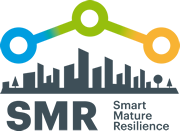A new video shows the journey of seven cities towards a resilient future. Climate scenarios of increasing storms, floods and heat waves have lately become a reality and are putting citizens’ health and lives at risk as a result of climate change.
Human-made disasters such as terrorist attacks used to happen every 5 years in European cities and are now occurring several times a year. Local governments need to prepare their infrastructure for the worst in order to protect their communities, but these challenges transcend national borders and city limits.
“We are changing, the cities are changing, the world is changing and we also need to see outside the borders, to learn and to share information. And I think ICLEI is a great opportunity and a great platform for us to do that,” said Silje Solvang, Municipality of Kristiansand (Norway).
Cities need to work together to build a resilient urban environment where their communities can thrive. Kristiansand, along with the cities of Bristol (United Kingdom), Donostia (Spain), Glasgow (United Kingdom), Riga (Latvia), Rome (Italy) and Vejle (Denmark) have worked with research scientists, ICLEI – Local Governments for Sustainability and DIN to co-create and test a Resilience Management Guideline. The Resilience Management Guideline consists of five steps, which cities can follow to integrate resilience into their city planning.
Developing this guideline and the supporting tools has begun a movement to go beyond adapting infrastructure to climate change and spurred cities on towards boosting social cohesion and quality of life as a primary focus of resilience.
“When I initially came to the project it was very much about future proofing places and infrastructure,” said Lucy Vilarkin, city of Bristol. “For me, the emphasis has shifted onto people and organisations, and how we deal with tackling health issues and building healthy organisations.”
For more information, click here.


